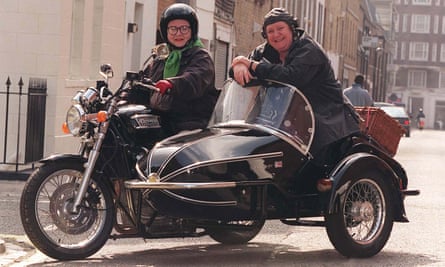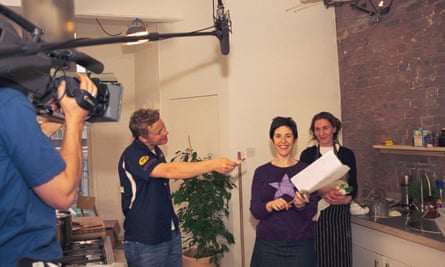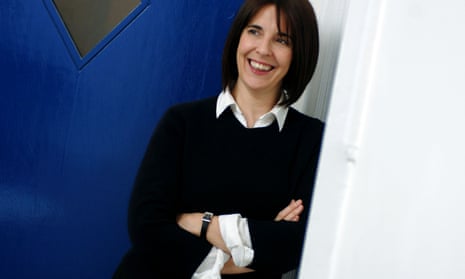At a time when most TV food shows were as dull as boiled vegetables in white sauce, Pat Llewellyn, who has died aged 55, revolutionised cookery on the small screen with the roar of Two Fat Ladies on a motorbike. She unveiled Jamie Oliver as The Naked Chef and transformed Gordon Ramsay from a terrifying, swearing chef off screen into an engaging, swearing one on camera. Pat’s vision encouraged a whole younger generation of men to learn to cook and she played a major role in Britain’s food revolution over the past two decades.
Inventing one TV show that becomes a global hit is hard enough. Pat achieved international success with three series: Two Fat Ladies, The Naked Chef and Ramsay’s Kitchen Nightmares. She proved a highly astute businesswoman, too. In 2005 she and her husband, Ben Adler, bought out her business partner at Optomen and she took over as managing director. The business grew from £7m in 2004 to a global turnover of £57m in 2014.
Unusually for such a successful TV supremo, Pat combined immense imaginative flair with a warm and generous personality, which I came to appreciate as a friend in the later years of her life. We had lunch together at her home just a week before her death from cancer. Pat managed to be lively, funny, even gossipy, and still had the sensitivity and kindness to comfort me about the recent death of my own father.
That empathy enabled her to become one of British television’s most successful producers, because she knew not only how to spot presenters but how to develop their personalities on screen. Sophie Grigson, who worked with Pat on Eat Your Greens in 1993, told the Independent in 2001: “Looking back at it, Pat was brilliant at what she did. She has a rare ability to spot people who are going to come across well on television. She allows her presenters to flourish by supporting rather than intimidating them.”

No one could intimidate the next duo Pat created. During the filming of Eat Your Greens, the formidable Clarissa Dickson Wright, then running an Edinburgh cooks’ bookshop, had a cameo role extolling the virtues of cardoons. Not long afterwards, Pat had lunch with Jennifer Paterson. Watching Paterson ride away on a motorbike, a brainwave hit Pat. She introduced the two cooks to each other, added a sidecar and in 1996 Two Fat Ladies was born.
This was an era when most food programmes were dominated by male restaurant chefs, so the idea of two rather large, older posh women as the main presenters, cooking old-fashioned dinner-party food, was revolutionary. Their eccentricity, politically incorrect views and zest for lard, clotted cream and fatty meats stimulated viewers’ palates jaded by polenta and puy lentils. Dickson Wright memorably said about the proper application of butter to a cake tin “You really want to get it well greased. Did you see Last Tango in Paris? Something like that.” Seventy million viewers watched worldwide.
Pat told the Guardian in 2007 that the series “actually was basically everything about my life. Horrible posh boarding school, fat matrons. I was exorcising demons.”
School was Netherwood, a boarding school in Saundersfoot in Pembrokeshire, followed by Westonbirt school in Gloucestershire. Pat’s parents, Anne (nee McDowall) and Eric Llewellyn, ran the Emlyn Arms, a hotel in the Carmarthenshire town of Newcastle Emlyn, which for many years was, apart from the Walnut Tree in Abergavenny, the only restaurant in Wales in The Good Food Guide.
Born in Carmarthen, Pat was proud of that Welsh heritage and enjoyed showing visitors her collection of carved love spoons.
There was no original intention to carry on her parents’ love of food. Pat’s degree was in French and film studies at Middlesex Polytechnic (now Middlesex University), including a year at the Sorbonne, followed by a master’s in film studies at the Polytechnic of Central London (now the University of Westminster). She went from university to the British Universities Film & Video Council and then got a job at Channel 4 as an assistant in the education department. There Pat was encouraged to get into production by Sue Shephard, a commissioning editor who spotted her latent talent.

In 1992 Pat joined Wall to Wall Television, and pitched an idea back to Channel 4. This was Talking Liberties, a series of interviews by Jonathan Rée with philosophers and critical thinkers, including Jacques Derrida (so her French degree came in useful), about the relationship between philosophy and human rights. Fortuitously for her career, food won out over Foucault. She developed Eat Your Greens for Wall to Wall, and joined Optomen in 1994, where she created Police, Camera, Action!, a ratings smash for ITV.
After the success of Two Fat Ladies, Pat’s next big hit came when she spotted a young man chopping spinach in the background of a River Cafe programme. In 1999, Pat launched Jamie Oliver in his first TV series, The Naked Chef, on BBC2, by taking an unusual approach. In the original pilot, the 23-year-old had come across as awkward and embarrassed because the director had filmed him straight to camera in the conventional way. Pat insisted on redoing the whole thing and engaged him in conversation off camera to ensure that his energy and passion would shine.
Oliver has acknowledged her “huge impact” on his early TV career and called her “one of the most gifted matriarchs of the TV industry. Her ability to spot talent and her timing, together with oodles of creativity and sheer drive, made her a real force.”
Pat deliberately set out to appeal to a new audience for food shows – men. She made each half-hour episode a commercial for Oliver’s lifestyle, with a clear subtext that cooking was sexy and if you wanted to be popular with girls you should learn to cook. A generation of men who had never been interested in food took up cooking because of The Naked Chef. At one awards do Pat was approached by Rick Stein, who fell to his knees in gratitude at her feet, explaining that his son had never had any interest in cooking, regardless of what he said to him, but that The Naked Chef had changed that overnight.

Mark Thompson, who as controller of BBC2 commissioned the programme, told me that “the show which placed Jamie’s food in a friends and family lived-in documentary context was spectacularly influential in the development of factual TV. I think she was the single most important creator of the new wave of food shows which eventually swept the world.”
It was tough when Oliver eventually left to form his own company but Pat quickly found new talent. For her next protege, she created a documentary format for Ramsay’s Kitchen Nightmares where the chef was so distracted by the failing restaurants that he forgot about the camera and viewers got the raw unvarnished Ramsay. The series, which first aired in 2004, made Ramsay a huge star in the US as well as in the UK.
Pat’s talent-spotting extended well beyond food programmes. In 2002 the archaeologist Neil Oliver made his first foray on screen in her show Two Men in a Trench for the BBC; and in 2007 the BBC2 series Mary Queen of Shops launched Mary Portas’s TV career. Pat’s creative talent was rewarded by three Bafta awards, two Royal Television Society awards, an International Emmy and a Grierson documentary award.
A few years back Pat had a quote from Hunter S Thompson on her office wall: “The TV business is a cruel and shallow money trench, a long plastic hallway where thieves and pimps run free, and good men die like dogs.” Pat’s own ethos belied that cynicism.
She is survived by Ben, whom she married in 2002.

Comments (…)
Sign in or create your Guardian account to join the discussion